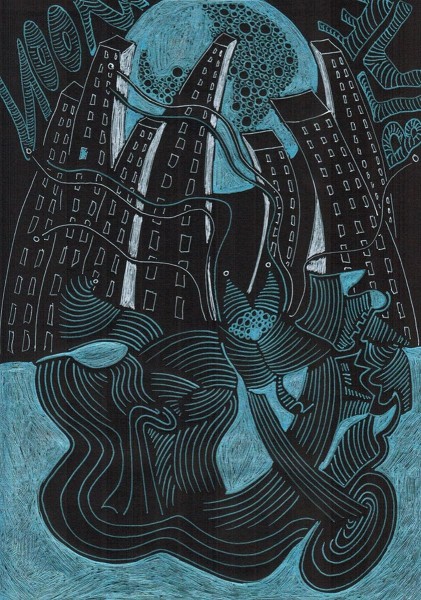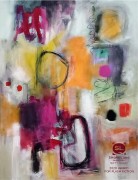My father began constructing his metropolis the morning after my sister died. It was odd. I came down the stairs in my fuzzy socks and polka dot shorts, hoping for coffee and finding the pot near empty. Just a layer of gritty water, some cigarette butts swimming in their own ash. It was six am, summer sun slathering our counters thick like with honey. I settled for water in a mug and cupped my hands around it as if it was warm.
The basement door was open, a sliver of light falling onto the pink-white checkered tile. Like a moth, I followed it. My father sat alone down there on a folding chair, stacks of square colored paper rising as walls on either side of him. On the table were a dozen origami houses, varying in color, size, subtleties which he had drawn on with ballpoint pens. Shingles on the roof of this house. Flower boxes in the windows of that one. A dirt path winding through a garden. It must have taken hours, the whole night even, but those were the insomniac days.
Morning, I said.
He looked at me, his eyes mapped with veins. Is it morning?
I pulled up our old piano bench and sat and this is how it went for weeks. I skipped school to pass him papers, locate the correct shade, increase his production capacity. Magenta, he said, and I handed him magenta. Turquoise, he said, and turquoise there was. It felt powerful, to make something appear that way. I willed color into existence, like a quiet god.
It took nearly a month before I realized that this town was our town. It was the details that made me see it, the stop signs, the trash cans, the telephone lines. It was our schoolyard, our grocery store, our backyard with the dead lilac bushes. Our wheat fields and our billboards and our water tower, from which my sister had thrown herself.
It’s our home, I said and pointed.
No, he said. It’s not.
I picked up a yield sign and fiddled with it. I wasn’t sure if he meant that it’s not home or that it’s not ours, but it seemed inappropriate to question.
Sometimes, but not often, I drive around after dark like we all used to. Roll the windows down, letting the music out and the shadows in. I circle the tower which rises from the earth like a talisman, metal glinting brighter than the stars, and I wonder what it was like up there that night. If the heat rose. If the cicadas sang. If the sweat slicked across her skin, refracting the moonlight into shards that rained down over us while we slept.
It used to be, my father said. We used to be.
I nodded, not saying any of the things that I ached to say. That it wasn’t our fault. That she was drunk and didn’t mean it. That she had been so sad for so long. But like her, I’m no good at speaking, or lying, or pretending to believe things that I wished I believed. It’s been months since she left, I wanted to say, and I am still finding pieces of moon tangled like glass in my hair.
I took his hand, rubbed the calloused skin of his knuckles as he started to cry, as the table shook and shook. I watched the paper houses tremble like how we watched the tornados come in the windy season, accepting that we were minutes away from never being the same. I only pressed my nose into his hair, which smelled of cinnamon sticks and safety and cobblestone after a hard, long rain.



 The core workshop of SmokeLong Fitness is all in writing, so you can take part from anywhere at anytime. We are excited about creating a supportive, consistent and structured environment for flash writers to work on their craft in a community. We are thrilled and proud to say that our workshop participants have won, placed, or been listed in every major flash competition. Community works.
The core workshop of SmokeLong Fitness is all in writing, so you can take part from anywhere at anytime. We are excited about creating a supportive, consistent and structured environment for flash writers to work on their craft in a community. We are thrilled and proud to say that our workshop participants have won, placed, or been listed in every major flash competition. Community works.